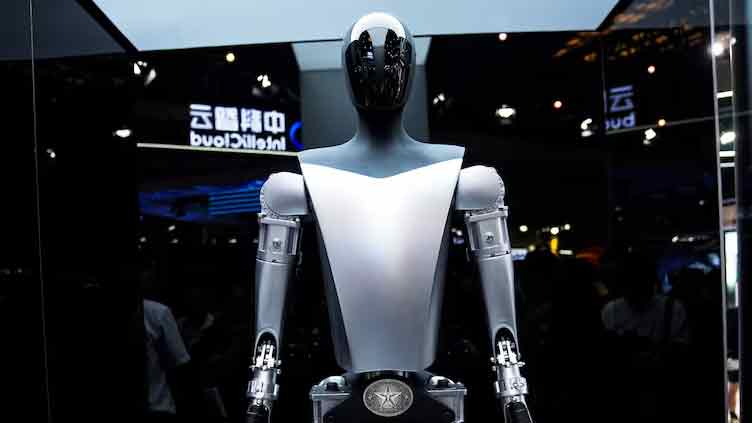- TECHSWU
- Posts
- TECHSWU #80
TECHSWU #80
Welcome to TECHSWU, your go-to destination for all things tech that matter in your daily life!

CES 2024, the world's largest tech event, took place in Las Vegas last week. The event featured major brands and companies showcasing their latest products, services, and innovations.
AI was a major theme at the event, with discussions focusing on the positive impact AI can have on various industries and job sectors. It was emphasized that AI should be embraced as it has the potential to enhance productivity and efficiency, rather than replacing jobs entirely.
Examples were given of how AI is already being used, such as in customer service interactions through chatbots and e-chat. The event also highlighted the importance of sustainability and how AI can be integrated into solutions for addressing issues like pollution, climate change, and disaster relief.
Overall, CES 2024 showcased the advancements in AI and its potential to transform various aspects of our lives.

In this article, the authors discuss the impact of premium video on demand (PVOD) on the video business. They start by mentioning the Emmy nominations and question whether anyone beyond the industry cares about them.
They then move on to talk about their personal experiences with watching TV shows and movies on various platforms and express skepticism about the effectiveness of PVOD. The article also touches on the importance of search and recommendation algorithms in streaming services and the potential impact of Warner Bros.
Discovery giving up on its experiment and selling off its assets. The authors conclude by reflecting on the changing landscape of the entertainment industry and the challenges faced by traditional media companies.

Xiaomi has launched its first clamshell foldable smartphone, the Xiaomi Mix Flip, in China. The device is powered by Qualcomm's Snapdragon 8 Gen 3 chipset and features a 4.
01-inch 1.5K flexible AMOLED cover display and a Leica-backed dual rear camera.
It runs on the latest Android 14-based Xiaomi HyperOS. The Mix Flip comes in three color options and is available in three storage variants with prices starting at approximately Rs.
69,000. The device also offers 5G connectivity, Wi-Fi 6E, and a side-mounted fingerprint sensor.
Xiaomi also introduced the Mix Fold 4 and Redmi K70 Ultra alongside the Mix Flip. The Mix Flip is available for pre-sale in China and will be officially released on July 23.

A recent survey conducted by Gartner has found that CEOs are placing a strong emphasis on growth and artificial intelligence (AI) for 2024. The survey revealed that 62% of CEOs identified growth as their top business priority, marking the highest level of prioritization since 2014.
Additionally, 34% of CEOs identified AI as the primary theme for future business transformations, surpassing digital transformation. However, while CEOs express confidence in AI's potential, they also acknowledge the challenges it poses, such as disinformation and deepfakes.
The survey highlights the need for a balanced approach to AI integration and a focus on mitigating operational challenges and supply chain issues. Overall, the survey's findings suggest a positive outlook for the future of AI, with increasing CEO confidence and a demand for AI solutions.

Elon Musk announced on Monday that Tesla will have humanoid robots available for internal use next year. These robots, called Optimus, will be able to perform tasks in factories.
Musk also stated that he hopes to have the robots in high production for other companies by 2026. Other companies, such as Honda and Hyundai Motor's Boston Dynamics, have been developing humanoid robots for several years.
These robots are seen as a solution to potential labor shortages and to perform repetitive tasks that can be dangerous or tedious. However, Musk has a history of failing to fulfill his bold promises, as seen with his previous claims about operating a network of "robotaxi" autonomous cars by 2020.
Despite this, Tesla shares were up about 1% premarket on Monday.

Vice President Kamala Harris, potentially the Democrats' new nominee for president, has a long history with the tech industry and has expressed her thoughts on various tech-related topics. While some industry critics believe she didn't do enough as attorney general to regulate big tech, Harris has called for more regulation and criticized tech CEOs.
She believes that companies like Amazon, Google, and Facebook should be "regulated in a way that we can ensure the American consumer can be certain that their privacy is not being compromised." As vice president, Harris has also spoken about regulating AI and ensuring a safer AI future.
However, venture capitalists Marc Andreessen and Ben Horowitz, among others, have expressed concerns that the Biden administration will "overregulate" AI. On the issue of TikTok, Harris believes there are national security concerns but has no intention of banning the app.
While she hasn't been as vocal about cryptocurrency, she would likely support the Biden administration's crypto regulations.

The Digital Design Days (DDD) will be taking place in Milan from October 6 to 8, 2024, bringing together creative professionals, entrepreneurs, and tech enthusiasts from around the world. With over 60 speakers and 3,000 guests expected to attend, the event aims to inspire innovation and business growth through digital design.
Participants will have the opportunity to participate in talks, workshops, and masterclasses led by influential figures in the industry, as well as network with like-minded individuals. The event will also feature creative installations by international digital artists and discussions on topics such as AI, luxury, digital fashion, and blockchain.
Founded in 2016 and curated by award-winning designer Filippo Spiezia, this year's theme is "Renaissance," emphasizing the importance of storytelling and design in a digital world. The event aims to highlight current and relevant topics such as AI, metaverse, NFTs, spatial computing, and blockchain.
Tickets can be purchased on the DDD website.

WhatsApp is reportedly testing a new feature that will allow users to create usernames, eliminating the need to share phone numbers. This feature is currently being developed for the web version of the app and aims to improve privacy and profile customization.
The unique username will act as an alternative identifier, allowing users to contact new acquaintances on WhatsApp without sharing their phone numbers. Only users who know the username will be able to contact the person.
It's important to note that this feature will not replace the current system entirely, as people who know the phone number will still be able to contact the user. While there is no exact information on the release date, it demonstrates WhatsApp's commitment to improving the user experience on the platform, along with other upcoming features like animated emojis and a file-sharing feature.

The Olympic Games have embraced the power of artificial intelligence (AI) to enhance the overall experience of athletes, broadcasters, spectators, and organizers. AI is being used in athlete training and performance analysis, providing insights that help optimize training regimes and prevent injuries.
Viewers also benefit from AI-driven analytics and graphics, which provide real-time insights into different sports, allowing for a deeper understanding and appreciation of the athletes' performances. AI is also playing a crucial role in the logistics and security of the Games, ensuring smooth operations and safety through tasks such as crowd management and event scheduling.
Additionally, AI is being used to promote sustainability by optimizing resource allocation, energy consumption, and waste management to minimize the environmental impact of the Games. As AI continues to evolve, the future of the Olympics holds even more potential for AI applications, ranging from personalized training programs to virtual reality experiences for fans.
The integration of AI in the Olympics represents the meeting point of human athletic prowess and technological advancement, reimagining what the Games can be.

A new $16,000 humanoid robot has been garnering attention for its unsettling human-like behavior. Created by Unitree Robotics, the G1 robot is showcased in a YouTube video demonstrating its eerie abilities, such as a torso rotation reminiscent of a scene from The Exorcist and quick recovery from falls.
This level of dexterity is a departure from the previous focus on robots that merely imitate human actions. The G1's flexibility is similar to the latest iterations of Boston Dynamics' Atlas robot, which is known for its innovative methods of getting back on its feet.
However, while these advancements in robotics are impressive, they also raise ethical questions when it comes to witnessing a robot enduring physical aggression. This shift in development reflects a broader trend in the industry, as companies explore superhuman capabilities and push the boundaries of what robots can do.
It seems we are moving away from robots as mundane task workers and toward a future where they engage in creative and complex activities.

Jess Lee, co-founder and CEO of fashion website Polyvore, is profiled in this article, which highlights 10 things to know about her. The article notes that Lee, who is one of the most successful entrepreneurs to come out of Silicon Valley, is also a comic book fanatic and has modeled for Vogue.
Lee's path to Polyvore was unconventional -- as a user of the website, she wrote a letter listing out her complaints and suggested solutions; weeks later, she was hired by Polyvore. She received advice from Yahoo CEO Marissa Mayer and credits her as a mentor.
Despite being an introvert, Lee believes there are tips and tricks for managing it, such as having fewer and deeper conversations at events and blocking out rest periods. Lee also has a degree in computer science and enjoys watching YouTube videos in her spare time.